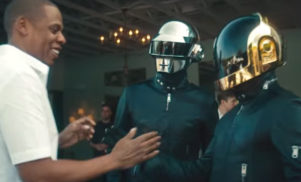Life has rarely resembled Zoolander quite like Tidal’s wackadoo press conference.
Last night, a crack team of pop stars assembled to announce the launch of Jay Z’s music streaming service, then sign some kind of document in solidarity, then quote Nietzsche. Equally strange and poorly conceived was this weekend’s surprise announcement of the nascent service, in which the same beautiful people painted their Twitter personas turquoise. This shitshow did very little to answer important questions about Tidal, such as “why?”, especially when the service’s $19.99 monthly fee is double that of Spotify (its most obvious competition).
It’s easy to clown Jay Z for the entire venture. It’s easy to roll one’s eyes when he drops eight figures on a Scandinavian tech company. It’s easy to write him off as, at best, out of touch, or, at worst, straight-up arrogant for diving headfirst into the crowded, impossible field of music streaming. But like Derek Zoolander, Mr. Carter’s heart might be in the right place. And if you look past the beautiful celebrities and (insert Zoolander reference here), there might actually be a plan unfolding.
To see Tidal’s potential, one has to understand streaming music’s uphill climb thus far. As with every music-related business on the internet, the heart of the problem is simple: music is just not worth what it used to be and the recording industry has struggled to adjust. In the old, pre-internet world, there was enough money in sales, licensing and radio. Artists more or less kept their money from tours and merch. As music itself dropped in value, the industry adjusted with the advent of the much-maligned “360 Deal”: now it’s pretty standard for labels to get a cut of road money and merchandise.
But streaming music was out of reach. The industry saw services like Spotify and Pandora (or Rhapsody and iMeem if you’re an OG) as the logical successor to terrestrial radio. And so they demanded terrestrial radio money for the rights to the music. But radio money came from national ad campaigns, and had grown exponentially due to decades of media consolidation (a story for another time). It was years before the major labels even considered striking a deal with any streaming music services. And when they finally did, artists began complaining constantly about the meager checks they see from Spotify and its ilk.
(Given the intractable math, it’s not a coincidence that the most important streaming music site on the planet — or at least the western hemisphere — is only tangentially in the game. YouTube never had to balance the books on music alone because it was also selling ad space against a billion other types of entertainment, although the Google money didn’t hurt either. YouTube diversified.)
With Tidal, Jay is diversifying in a different direction: he has vertically integrated music streaming into Roc Nation. His little corner of the music industry was already in the business of management and recording. Now it can serve the product as well. In that context, Tidal doesn’t have to make money or even really be solvent: in-house music streaming is worth a loss if it can offer artists incentives to come join the Roc. And one has to imagine the money will flow a little easier directly from Tidal to Roc Nation artists, as opposed to Spotify, whose money has to work its way through the bureaucracy of several multinational corporations before anyone gets paid.
(Speaking of the artists, while it’s easy to clown Madonna throwing her leg up on the table or deadmau5’s stupid head, it’s important to remember that most of those beautiful people are essentially still employees of a handful of companies. And those companies are owned by people — mostly white men — who make Jay Z look broke. And those people are trying to prop up a bloated industry in the midst of an existential crisis, while paying dozens of middle-managers six-figure salaries to do what millions of broke weird teenagers do on the internet in their spare time.)
From this optimistic standpoint, Tidal doesn’t have to compete to be a major factor. It just has to work. That’s not to say that it will; the service still has an uphill climb to relevance. Nicki Minaj may have her army of Barbies arguing over who changed their Twitter pic to the signature teal first, but it’s unclear how that will translate to subscriptions. The service’s commitment to “high-definition content” is not encouraging. Feats of engineering are generally bad value propositions, especially when paired with a heavy toll on the user’s data plan.
But after thinking about it, Tidal is not old-ass Shawn Carter chasing an outdated business model out of some combination of boredom and hubris. It’s actually a forward-thinking step towards establishing Roc Nation as the only thing resembling a cohesive macro-entity in the modern music industry. And it is, potentially, a way to secure a bigger piece of the pie for artists.





























